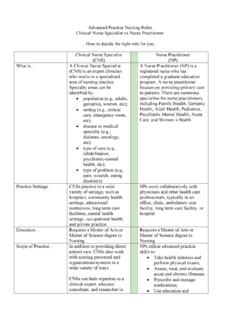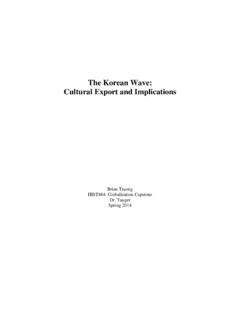Transcription of Trauma Affects Development Throughout the Lifespan
1 Trauma Affects Development Throughout the Lifespan A child's ability to cope with stress in the early years has consequences for physical and mental health Throughout life. Center on the Developing Child What do we mean by Trauma ? Events that are perceived as threatening the life/physical integrity of the child or someone important to child (and what is perceived as a threat changes with children's Development ). Causing an overwhelming sense of terror, helplessness, and horror;. Producing intense physical effects such as a pounding heart, rapid breathing, trembling;. And completely overwhelming the child's available coping strategies. National Child Traumatic Stress Network And this includes: Direct abuse o Physical abuse assault, being beaten, burned, shaken o Sexual abuse including inappropriate exposure to sexual activity or materials Neglect--Deprivation of basic needs perceived as Trauma by young children dependent on adults for care Domestic violence Witnessing violence Community violence Separation from important people Complex Trauma Caused by adults who should have been caring for and protecting the child, creating an impossible dilemma for young children--The person on whom I am dependent for protection and care also hurts me.
2 AND. Stress becomes Trauma when the intensity of frightening events becomes unmanageable to the point of threatening physical and psychological integrity [for child or parent]. Lieberman & Van Horn (2008). Stress Affects the developing architecture of the brain Three types of stress Positive stress motivates Development . Developmentally appropriate levels of stress can be growth- producing, such as the productive stress which accompanies challenge to support children's goals, the infant who becomes more irritable before achieving a major milestone, or birth of a sibling. This kind of stress is a normal part of life; learning to adjust to it is an essential feature of healthy Development and represents mastery. Tolerable stress refers to stress responses that could affect brain architecture but generally occur for briefer periods and/or with social supports that allow time for the brain to recover and thereby reverse potentially harmful effects.
3 Toxic stress refers to strong, frequent or prolonged activation of the body's stress management system. Stressful events that are chronic, uncontrollable, and/or experienced without the child having access to support from caring adults tend to provoke these types of toxic stress responses. National Scientific Council on the Developing Child (2005). Excessive Stress Disrupts the Architecture of the Developing Brain: Working Paper #3. The physiology of stress Our bodies have a response to perceived threat which involves mobilizing energy resources and focusing our attention to deal with the immediate needs of the threat. This physiological response to stress prepares us for flight or fight.. In response to stress: o Stress sets off a chain reaction in our brain which results in the production of cortisol, the stress hormone that triggers a change in our entire nervous system.
4 O Respiration, heart rate, attention, memory for threat and energy availability increase;. o Our bodies defer future needs' such as digestion, sleep, immune system functioning and tissue repair, physical growth and exploration/play. And this can look like: o Fight dysregulated, aggressive attempts to manage o Flight withdrawn, shut down o Freeze--dissociated o Tend and befriend' clingy, caretaking Early Trauma can impact brain Development A healthy stress system turns on when we need it and turns off when we don't this is essential to ensure our survival. Relationships buffer the young child from stress and promote resiliency. Chronic stress Affects the brain including memory, selective attention, self-control and the ability to turn off the stress response. Being chronically wired' in this state of high alert' interferes with children's ability to explore and learn from their environment and socialize with others.
5 States become traits over time as the brain is developing. Neural circuits for dealing with stress are especially plastic' during the fetal and early childhood period frequent or prolonged activation of stress hormonal systems can alter functioning of neural systems including the parts of the brain essential for learning and memory. Toxic stress during this early period can affect developing brain circuits and hormonal systems in a way that leads to poorly controlled stress-responsive systems that will be overly reactive or slow to shut down when faced with threats Throughout the Lifespan . Center on the Developing Child (2005) Excessive stress disrupts the architecture of the developing brain Trauma impacts the child's developmental trajectory Development is cumulative, each stage builds on the last and is impacted by previous experiences.
6 The higher the number of risk factors, the more likely the child will have significant developmental delays. Development is transactional--it occurs within the interactions between the child and primary caregiver so Trauma anywhere within the system (parent or child) impacts the whole system. Trauma shapes children's beliefs and expectations about: Themselves (I am not worthy of love and care. I am helpless or I must be on constant alert and/or be in complete control to be safe.). The adults who care for them (Adults cannot be trusted to protect me/Adults hurt me). The world in general (The world is a dangerous place. I cannot let down my guard.). Trauma can affect parenting (and thus the quality of attachment between parent and child): A parent's own early childhood Trauma may prevent her/him from helping their child to regulate fear or distress because they ignore the child's distress to avoid triggering their own traumatic response a defense mechanism by which the parent literally cannot see their child's distress.
7 The child may be a Trauma reminder for the parent either from their past (This baby is just like everyone else in my life who ignores my needs) or something present (This child is just like his father who left me/hurt me). A parent's removal from their own emotional experience of Trauma may result in their inability to notice danger and protect their children from it. Or the parent may anticipate danger everywhere, rigidly avoiding experiences necessary to promote the child's healthy Development . Parents traumatized by domestic violence may associate the child with the aggressor and may respond by experiencing the child as the victimizer (I am helpless to set limits for this out-of-control monster) or by becoming very harsh with the child (I'll show this child he can't dominate me).
8 This may look different at different stages of the child's Development , the mother who can care adequately for her infant until the infant becomes mobile and the mother experiences normal toddler exploration and striving for autonomy as abandonment and/or rejection. The parent who has so little capacity to regulate her own level of arousal and emotion as the result of her own Trauma is unable to provide the regulatory care needed by her very young child, setting up attachment problems ( anxious or disorganized attachment) and the inter- generational perpetuation of Trauma effects. Poverty is associated with multiple environmental stressors ( lack of basic needs, racial/ethnic discrimination, educational and employment disadvantages). The absence of resources for adults is inevitably translated in the lack of access to basic parenting resources for children.
9 (Lieberman & Van Horn, 2008). The role of intervention is to restore developmental momentum, to get Development back on track' for the child, the parent and the relationship. To understand the impact of Trauma on a child, practitioners need to hold the multiple perspectives of the child, the parent, the parent-child relationship AND hold the perspective of our own self-awareness. We don't need to figure out the Trauma : We need to be aware of how Trauma arousal (stress biology) and memory affect the present. (Gearity). Be aware of Trauma reminders' body-based reminders, danger signals, emotions, historical Trauma ( racial/cultural differences). May be evidenced by unpredictable behavior, switches.'. Offer a reparative relationship to the parent, a parallel process' of the experience of a predictable, consistent, nurturing relationship so that she is better able to do that for her child.
10 You can expect help from me. Relationships don't have to hurt. We can have conflict and still have a relationship. I will follow through with what I say I will do. Joining the child/parent is the first step to ANY Trauma work-- we need to look for the underlying meaning of the behavior and respond accordingly. What is the meaning of the no show'? Might the parent feel abandoned by me when I had to reschedule? Help the parent connect the dots between what happened in the past and how she would like things to be for her baby. This helps parents to know that they can choose how they want to parent taking the good' and leaving the bad' from their own upbringing. Who helped you feel better as a child? How would you like that to be for your child? Restore the protective shield' (Child Parent Psychotherapy-CPP) Help to restore the parent's confidence that she can protect her child and the child's confidence that the parent will protect him.










